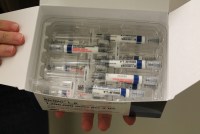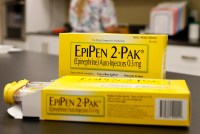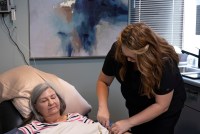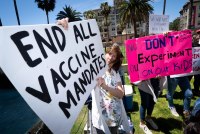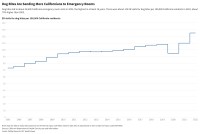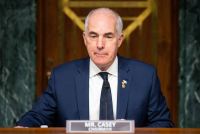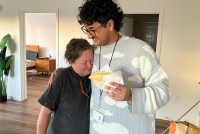Latest KFF Health News Stories
Surge in Syphilis Cases Leads Some Providers to Ration Penicillin
Injectable penicillin is the go-to treatment for syphilis and the only treatment considered safe for pregnant people with the disease. But as rates of syphilis increase across the U.S., a shortage of the injectable has prompted some public health agencies to ration it.
Montana Vows Changes to Avoid Delayed Contracts. Some Health Providers Still Await Back Pay.
The head of Montana’s health department said the agency is catching up on a months-long backlog of contracts with organizations that connect people to medical care that left organizations without pay, halted some services, and triggered job cuts.
The FTC Is Attacking Drugmakers’ ‘Patent Thickets’
It’s a big job clearing out so-called “patent thickets” drugmakers create to keep their products’ prices high. But the Federal Trade Commission is giving it a shot.
Ketamine Therapy for Mental Health a ‘Wild West’ for Doctors and Patients
Ketamine, approved by the FDA as an anesthetic in 1970, is emerging as a major alternative mental health treatment, and there are now more than 500 ketamine clinics around the country. But with little regulation and widely varying treatment protocols, it’s a medical “wild West.”
An Arm and a Leg: Self-Defense 101: Keeping Your Cool While You Fight
On this episode of “An Arm and a Leg,” host Dan Weissmann seeks advice for fighting unfair medical bills from an unexpected source: an expert in self-defense.
How Fringe Anti-Science Views Infiltrated Mainstream Politics — And What It Means in 2024
Opposition to vaccines and other public health measures backed by science has become politically charged. That makes dangerous misinformation much harder to fight.
Readers Weigh Downsides of Medicare Advantage and Stick Up for Mary Lou Retton
KFF Health News gives readers a chance to comment on a recent batch of stories.
Records Show Publix Opioid Sales Grew Even as Addiction Crisis Prompted Other Chains’ Pullback
As national prescription drug distributors and pharmacies restricted the flow of oxycodone and other painkillers in response to the growing opioid crisis, Florida’s most popular grocery store ramped up its sales and distribution of the highly addictive drugs, according to a Tampa Bay Times analysis of federal data.
Ouch. That ‘Free’ Annual Checkup Might Cost You. Here’s Why.
The designers of the Affordable Care Act might have assumed that they spelled out with sufficient clarity that millions of Americans would no longer have to pay for certain types of preventive care. But they didn’t reckon with America’s ever-creative medical billing juggernaut.
A Record Number of Californians Are Visiting Emergency Rooms for Dog Bites
There were nearly 50,000 emergency room visits for dog bites in California in 2022. The rate of such visits per capita is up about 70% since 2005.
Senate Probes the Cost of Assisted Living and Its Burden on American Families
In the wake of a KFF Health News-New York Times series, members of the Special Committee on Aging are asking residents and their families to submit their bills and are calling for a Government Accountability Office study.
What the Health? From KFF Health News: Health Enters the Presidential Race
New Hampshire voters have spoken, and it seems increasingly clear that this November’s election will pit President Joe Biden against former President Donald Trump. Both appear to be making health a key part of their campaigns, with Trump vowing (again) to repeal the Affordable Care Act, and Biden stressing his support for contraception and abortion rights. Meanwhile, both candidates will try to highlight efforts to rein in prescription drug prices. Alice Miranda Ollstein of Politico, Anna Edney of Bloomberg News, and Jessie Hellmann of CQ Roll Call join KFF Health News chief Washington correspondent Julie Rovner to discuss these issues and more. Also this week, Rovner interviews Sarah Somers of the National Health Law Program about the potential consequences for the health care system if the Supreme Court overturns a key precedent attempting to balance executive vs. judicial power.
The Colonoscopies Were Free. But the ‘Surgical Trays’ Came With $600 Price Tags.
Health providers may bill however they choose — including in ways that could leave patients with unexpected bills for “free” care. Routine preventive care saddled an Illinois couple with his-and-her bills for “surgical trays.”
New York Joins Local Governments in Erasing Billions in Medical Debt
New York City is the latest jurisdiction to buy and forgive a backlog of unpaid medical bills for its residents. Local governments across the country, including in the Chicago area, are doing the same to reduce debt burdens for lower-income residents.
Preparing to Hang Up the Car Keys as We Age
As cognitive skills erode with age, driving skills weaken, but an aging driver may not recognize that. Advance directives on driving are one way to handle this challenge.
In Los Angeles, Occupational Therapists Tapped to Help Homeless Stay Housed
Los Angeles County is deploying a small team of occupational therapists to help newly housed individuals adjust to life indoors. Therapists are trained to recognize disabilities and help with basic living skills, such as hygiene and cleanliness, that can help prevent clients from getting evicted or slipping back onto the streets.
988-Hotline Counselors Air Concerns: More Training Needed to Juggle a Mix of Calls
Dozens of crisis counselors responded to a survey about their work experiences, painting a picture of uneven training, uncertainty about how long to stay on the line, and different policies on whether to inform a caller when police are on their way.
With Trump Front of Mind, New Hampshire Voters Cite Abortion and Obamacare as Concerns
New Hampshire’s primary election was dominated by voters’ feelings about Donald Trump. But health care remains a concern — and for Democrats, preserving abortion access is a priority.
Medicare Advantage Is Popular, but Some Beneficiaries Feel Buyer’s Remorse
Medicare Advantage plans are booming — 30.8 million of the 60 million Americans with Medicare are now enrolled in the private plans rather than the traditional government-run program. But a little-known fact: Once you’re in a Medicare Advantage plan, you may not be able to get out. Traditional Medicare usually requires beneficiaries to pay 20 […]
As climate change-driven wildfires increasingly choke large parts of the United States with smoke each summer, new research shows residents in long-term care facilities are being exposed to dangerously poor air, even those who don’t set foot outside during smoke events.



